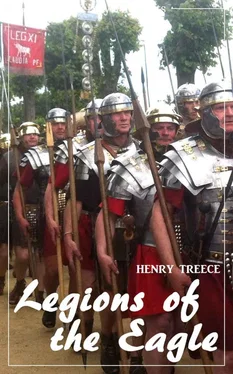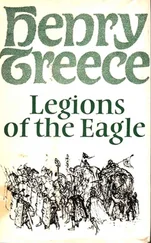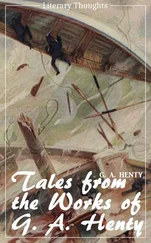Legions of the Eagle by Henry Treece
Literary Thoughts Edition presents
Legions of the Eagle,
by HenryTreece
Transscribed and Published by Jacson Keating (editor)
For more titles of the Literary Thoughts edition, visit our website: www.literarythoughts.com
All rights reserved. No part of this edition may be reproduced, stored in retrieval system, copied in any form or by any means, electronic, mechanical, photocopying, recording or otherwise transmitted without written permission from the publisher. You must not circulate this book in any format. For permission to reproduce any one part of this edition, contact us on our website: www.literarythoughts.com.
This edition is licensed for your personal enjoyment only. It may not be resold or given away to other people. If you would like to share this book with another person, please purchase an additional copy for each recipient. If you’re reading this book and did not purchase it, or it was not purchased for your use only, then please return to Amazon and purchase your own copy of the ISBN edition available below. Thank you for respecting the efforts of this edition.
Part One—A.D. 43.
CHAPTER 1 – A KNIFE FOR A HARE
It was high summer and young Gwydion of the Belgae ran excitedly among the trees, his dog at his heels, hunting. Gwydion, who was almost thirteen, and a big boy for his age, was the only son of Caswallawn, a lord who rode at the right hand of Caratacus the king, so the boy's dress, even when hunting, was rich and colourful, as befitted his father's rank. A fine sight he made, as he ran among the oak and the hornbeam, on the green slopes above the city of Camulodunum. His long fair hair swept behind him in the afternoon breeze, and his heavy linen cloak, coloured red and blue and green to show which tribe he belonged to, swung out behind him, held to his shoulders by round bronze brooches with brightly enamelled centre-pieces. He wore a tunic of thin deerskin, supple and pliable, its edges sewn with silver thread; a broad red belt about his middle, and light, fawn doeskin shoes on his feet.
The dog which trotted behind him was of the greyhound type, but smaller and shaggier. He wore a narrow bronze collar round his neck, inscribed with Gwydion's tribal sign.
So the two ran through the late afternoon of summer, the sun's rays glinting on them both, lighting up the dog's metal collar and the polished gold neck-ring and shoulder-brooches of the boy. Together they made a fine pair; yet such a pair as might have been seen almost anywhere in southern Britain at this time, for the Belgae were powerful and rich, and had the secret of working metals and of weaving fine cloth. Moreover, they were a people who loved finery almost as much as they adored battle, and that was a great deal!
At last the boy stopped and sat down, breathless. "It's no use, Bel," he said. "We shall never run down a deer today! We are too fat and well-fed, my friend! Let us call through the woods and see if Math has been lucky!"
Bel, the hound, seemed to understand his young master's words, and rose again, wagging his long tail at the mention of Math's name.
"Math! Math! Where are you?" called Gwydion, his hands to his mouth to make the sound carry through the dense woodland. Bel began to bark at the echoes that came back to them, eerie and startling from the dark shadows of the wood where the sun never penetrated.
They waited for a while, and then Gwydion shrugged and began to walk towards his father's house, which he could just see, set high on a terraced hill, perhaps a mile away.
But before he had gone far, the sound of shuffling footsteps could be heard from the dim wood, and in a few moments another boy stumbled out into the sunlight, gasping for breath and looking afraid.
"Where on earth have you been, Math?" asked Gwydion, a little cross from waiting. "I bet you're the only slave in these parts who is allowed to go running off like that, on his own, and keeping his master's son waiting, as you have kept me!"
Math, who was a little older than Gwydion, and very dark-haired, gave a little salute, as though apologising, and then began to gasp again. He was dressed in a simple linen tunic, with a raw-hide belt, and light running shoes of cowskin. He wore no jewellery, but was clean and obviously well cared for. Gwydion smiled when he saluted, for that small gesture satisfied the boy's pride, and now he was quite friendly to Math again.
"You must be in a terrible state, Math," he said, kindly, "when you forget to give me my proper due! And where are your bow and arrows? Have you lost them?"
Math looked at his companion with wide brown eyes and an expression of fear on his swarthy face. "I flung them away," he said hoarsely, almost as though he did not wish anyone to hear his words.
Gwydion stared at him in surprise. "Flung them away!" he repeated. "But, Math, how could you; my father brought you that bow all the way from Londinium. It was a Scythian bow, made of many strips of horn, not like an ordinary wooden bow. It cost him quite a lot of money, you know. Why, I'd have liked it myself. Why did you throw it away? Can I have it if I find it?"
Math fell on his knees before his friend. "You must never touch it, Gwydion," he said. "It is taboo now. I had to fling it away."
Gwydion looked down at him in consternation. "What have you done, Math?" he said in a whisper. "Have you killed a man?" Gwydion knew that though a free man could kill an opponent and even be praised for it, a slave had no right to take human life, not even in his own defence.
Math began to weep as he crouched among the grass. Then he looked up and gazed at Gwydion with terrified eyes. "I have done worse than that," he said. "I have killed a—hare."
His friend gave a small gasp of astonishment and for a moment seemed to draw away from him. Then he said, "But, Math, that is a sacred animal; only they may kill it." He did not name the druids as the only men who might kill the creature; he was afraid that they might hear him, in their strange, magic way, if he did, and know what Math had done straightway; and Gwydion was afraid of the druids, although one of his kindest uncles happened to be a druid.
"It wouldn't be quite so bad," Gwydion went on, "if the hare were not our own animal, yours and mine; the animal of our Brotherhood, the Brotherhood of the month we were born in, the two of us."
Math dropped his head in his hands and wept without shame. "Something dreadful is bound to happen, now, Gwydion," he said. "The gods are certain to punish me. I feel sure of it! Oh, what shall I do?"
Gwydion went to him and helped him up, putting his arm round him, and trying to sound brave. "The worst cannot happen," he said, "for your hair is black, and they, the holy ones, only sacrifice red-haired ones under the great Midsummer Stones. So it won't be that. Besides, an idea has struck me—you have no rights in law. In fact, as far as the law of the Belgae goes, you don't exist, for you are a slave."
Math was a dark-skinned Silurian from the far west, who had been captured when he was a small boy, on some foraging raid that Gwydion's father had made. Therefore he did not come under Belgic law, which was laid down in the Council Chamber of Caratacus in Camulodunum. Math listened, but his face was still clouded.
"That is all right for the law of men," he said. "But the gods have their own laws, and it is one of these I have broken. They do not care for the laws the Belgae make. The gods are their own law-makers."
Gwydion looked uncertain for a moment, and bit his lip, as though in deep thought. At last he half-turned from Math and said, "My father is responsible for you, both to the king and to the gods. But my father was not with us today and did not know what you were doing. He cannot be held responsible for something which he did not know about. So, I must be responsible, for I am my father's only son. Yes, I am responsible."
Читать дальше












